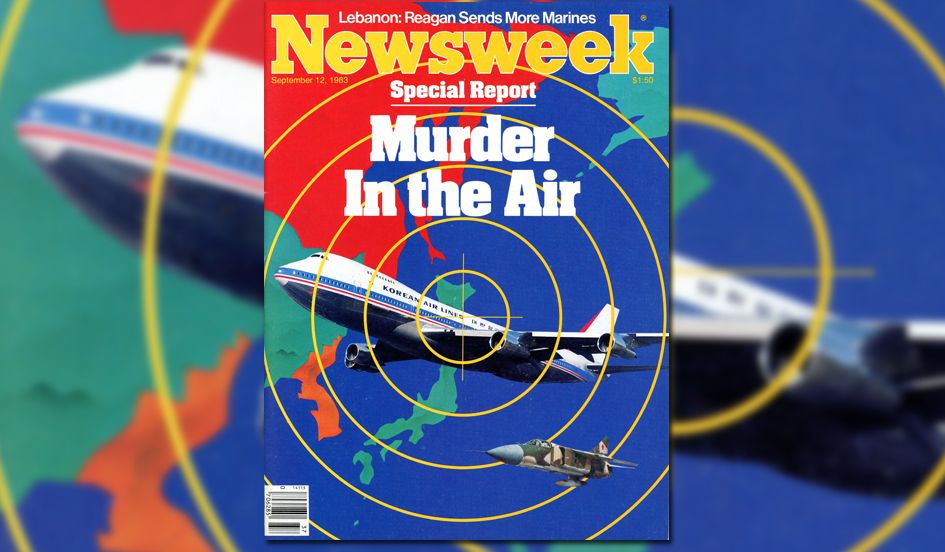
If it turns out that the Malaysia Airlines 777 that crashed in Ukraine was indeed shot down, it won't be the first time a commercial airliner was downed by military action. The most infamous instance occurred in 1983: Korean Air Lines Flight 007, a jumbo jet carrying 269 people, was gunned down by a Sukhoi Su-15 fighter jet after straying into Soviet airspace.
The shock and outrage the rest of the world felt after that plane went down was captured on the September 12, 1983 cover of Newsweek: It shows a Korean Air Lines 747 with a bullseye over it; with "Murder in the Air" in large letters.
[Related: U.S. Intelligence Thinks Flight MH17 Was Hit by a Missile, Killing 295 | MH17's Flight Pattern Over a War Wasn't Unusual]
Aspects of the incident are still mysterious, but this much is clear. The flight took off from New York City on August 30, then made a stop to refuel in Alaska. Its final destination was Seoul. But after leaving Anchorage, likely because of an incorrect setting on the plane's autopilot, it crossed into Soviet airspace.
Here's how Newsweek described the final moments in 1983:
As far as the United States was concerned, it was a case of wanton slaughter in the skies. The electronic evidence was convincing: the Soviets had tracked Flight 007 a full 2 ½ hours before the Su-15 fired, a lag that would have permitted the decision to be reviewed at the highest levels in Moscow. The fighter pilot trailed his target for 14 minutes before the attack—and radioed full recognition that his missiles were locked on a civilian commercial aircraft. The fatal shot itself appeared to be no accident: according to reported transcripts published in Japan, every move was carefully orchestrated by ground controllers.
"The pilot was ordered to take aim at the target. He replied that the had taken aim (sic). The controller ordered him to fire. Pilot: "The target is destroyed. I am breaking off attack."
Years later, CNN explained that tensions over U.S. spying in the area played a role:
As it neared Soviet airspace, Flight 007 was being tracked at military installations. Soviet fighter pilots and their commanders knew they were being watched, too. U.S. spy planes patrolling the region created a constant state of tension, they said later.
"American surveillance aircraft included Boeing RC-135s, the military version of a Boeing 707, which looked very much like a civilian airliner.
Years after the incident, the Soviet pilot who pulled the trigger that day said he noticed the double-decker configuration of the plane, and told CNN he had "wondered if it was a civilian aircraft." But regardless, he "fulfilled his mission" to "destroy the intruder."
CNN said the Soviets didn't try to get in touch with the plane via radio.
U.S. President Ronald Reagan, who was initially faulted for not reacting strongly enough to the Soviet move, called it a "barbaric act." It raised tensions during the Cold War. Ironically, one of the passengers was an anti-Communist congressman, Lawrence P. McDonald, Democrat of Georgia. He was a polarizing figure who praised Senator Joseph McCarthy and thought that Martin Luther King Jr. was under the sway of Communists, as a Newsweek sidebar in the same issue pointed out. The fact that he died in a plane shot down by a Soviet fighter jet was a realization not of his "worst fears" but of his "everyday ones," Newsweek reflected.
As for relatives of the people on board, their fears were cruelly fed by false information:
At the airport in Seoul, friends and relatives at first were told that Flight 007 was "running late." Then airline officials reported—perhaps wishfully—that the big jet, forced down by Soviet pursuit planes, had landed safely on Sakhalin Island. When the true story finally broke, relatives went into shocked mourning and anti-Soviet demonstrations broke out from South Korea to the streets fronting the United Nations headquarters. …Forty-six relatives arrived from Tokyo to await the possibility that bodied might be returned.
With the exception of "a few human remains" that washed onto a Japanese island, CNN reported, the bodies of the passengers and crew were never found.
Uncommon Knowledge
Newsweek is committed to challenging conventional wisdom and finding connections in the search for common ground.
Newsweek is committed to challenging conventional wisdom and finding connections in the search for common ground.
About the writer
Rob Verger is liaison to Newsweek’s foreign editions and also reports, writes, and edits. In addition to Newsweek and its ... Read more
To read how Newsweek uses AI as a newsroom tool, Click here.





